The malaria mines of Venezuela
- Published
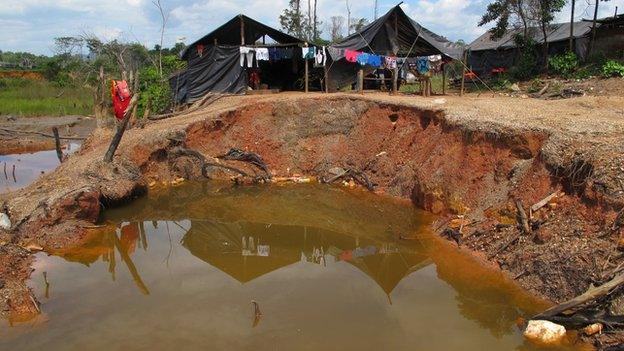
Miners sleep right next door to the standing water of the mines - perfect breeding grounds for mosquitoes
Venezuela used to be a world leader in managing malaria, but is now the only country in Latin America where incidence of the disease is increasing. Around 75,000 people were infected last year, and according to government figures, 60% of cases were in Sifontes, a tiny region of the country where gold mining - where workers drill for gold in mosquito-friendly standing water - is booming, and healthcare is scarce.
Jesus Cañas can barely speak when I ask him about the symptoms of malaria - he shivers, babbles and closes his eyes.
"The light is one of the things that I can't stand", says Cañas, 48, who's been mining for more than two decades in Bolivar, a tropical state in south east Venezuela.
Jesus is no stranger to the disease. He has been infected with malaria 54 times, he says. His wife has had it 20 times, and even his grandchildren have had it a couple of times.
Jesus believes it is worth risking his health for the financial rewards that gold mining brings.
"Here you can earn more money than elsewhere; with just one pan (of gold) you catch in a day what you will earn with the monthly minimum wage."
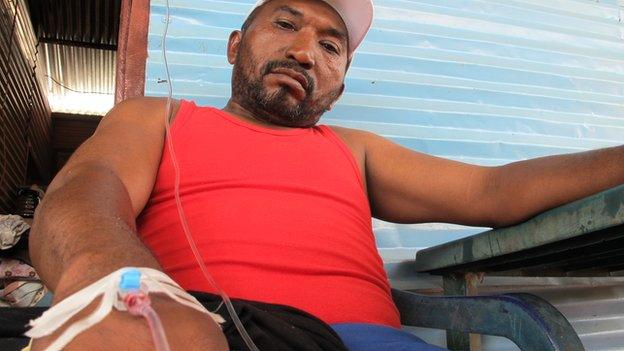
Jesus has been infected with malaria 54 times, but he won't stop his high-risk work as a miner.
From the 1960s to late 1980s, malaria was almost eradicated in the country. But because its tropical conditions, Venezuela has always had several pockets where the disease remained. These areas stayed under control until recently.
Last year, the country registered the highest number of cases of malaria in the last 50 years, with 300 out of every 100,000 people infected.
Throughout the previous decades the average was 75 cases in every 100,000. And according to the Ministry of Health, it seems that 2014 is going to be just as bad as 2013.
Both the government and critics agree that the cause of the surge is in part due to to the boom of illegal gold mining in the region.
Mining was introduced to the area decades ago.
Malaria is back in Venezuela with a vengeance
But in the past 20 years, thousands of miners have come from all over the continent, generating an environmental impact that helps the mosquitoes breed.
Most don't have permits to work - or even remain - in the country, causing overpopulation in a remote region where access to healthcare was already scarce.
It is the surge of malaria cases in Bolivar that puts the whole country at risk, says Jose Felix Oletta, a former Health Minister who is now director of Red Defendamos la Epidemiologia (Protect Epidemiology Network).
Because of it, says Oletta, "there are other endemic regions where the mosquito can thrive again."
The Venezuelan government says around 10 people die a year from malaria, but Oletta's organisation counted 80 deaths last year.
Wild life
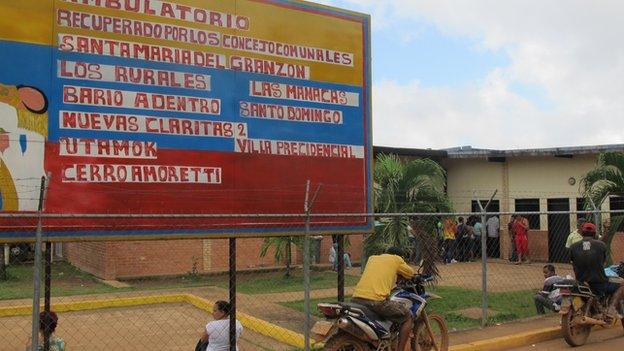
The nearest hospital to the mine is always busy with people queuing to get tested for malaria
So far this year, this country of 30m people has registered more than 45,000 cases of malaria, according to government statistics.
In the wild state of Bolivar, the municipality of Sifontes is "ground zero" of the malaria surge.
The environmental impact of mining has, as locals put it, "made mosquitoes angry."
The boom of illegal mines means more people eroding the rainforest, cutting trees and creating pools of stagnant water to extract gold.
The mining conditions, poor infrastructure, and ever-swelling numbers of people for mosquitoes to feast on, have created perfect conditions for malaria to spread.
Residents work either as miners, or as service providers to those who risk their lives at the mines.
There are shops around every corner where miners sell their gold, as well as pool bars and motels.
There is also a brand new government hospital, where every morning hundreds of ill-looking people queue to get tested for malaria.
Those who test positive receive a seven-day treatment, paid for by the government, which includes rehydration drinks to combat vomiting and diarrhoea, and pills that target the specific malaria parasite they've been infected with - vivax or falpicarum.
"Around 70% of the cases in Sifontes are vivax and the rest are falciparum," says Jorge Moreno, an entomologist who coordinates malaria research for the Bolivar's Health Ministry.
"Vivax is not fatal but has the strongest symptoms, whereas falciparum goes unnoticed but can suddenly kill you."
Treatment 'abandoned'
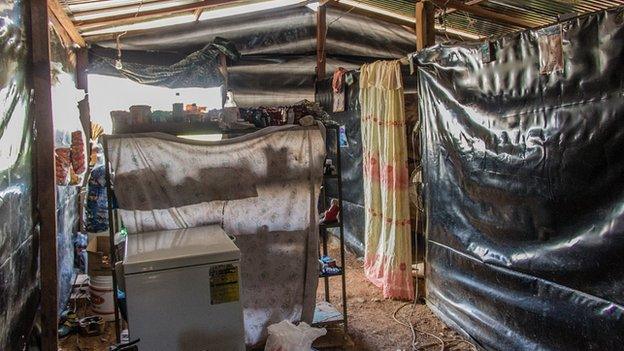
This shed made of plastic bags and zinc sheeting is where miners sleep
Proper treatment is essential for controlling malaria, but Ralph Brown, one of the hospital's six doctors, says this doesn't always happen.
"The problem is that only two days after feeling okay, patients abandon the treatment," he says.
"Then they start drinking, partying, they don't eat well, they have sex..." he says.
Many of the patients in Sifontes, however, complain of shortages of medicine - one of the effects of Venezuela's current economic crisis.
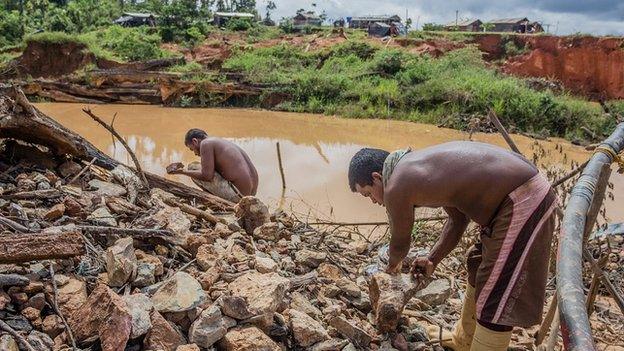
Mining for gold creates perfect conditions for malaria mosquitoes
Visiting the mine where Jesus works, it's easy to see how mosquitoes thrive in the humidity and mud.
The miners often sleep right next to the mine, in sheds made of black plastic bags, with zinc sheeting for roofs.
There's garbage, and stagnant, black waters surrounding just outside every tent. When the motors from the mine are off, you can hear the mosquitoes buzz in your ear.
"I have a mosquito net," says Jesus, as he shows me the hammock where he sleeps.
"But that doesn't really avoid the bite, as you can get it any time."
Doctors say the best way to protect yourself from malaria is to use repellent, cover up and stay inside at dawn and dusk - advice Jesus and his fellow miners largely ignore.
Human intervention
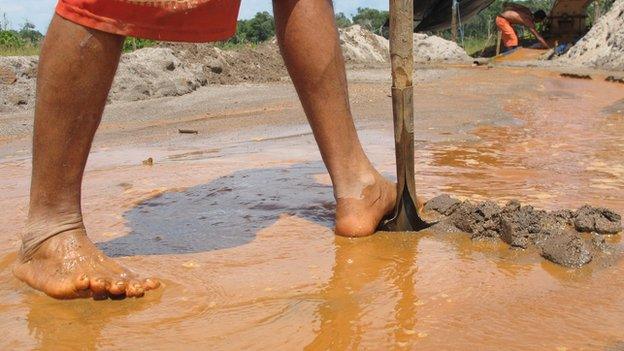
Advice to cover up to protect against bites is largely ignored
The government says it's doing what it can to control malaria.
Dr Armando Ortega, director of environmental health at the Institute of Public Health in Bolivar is responsible for controlling malaria in the state.
"Environmental conditions like rainfall, humidity and hydrostatic pressure make the mosquito well adapted to the region."
But human intervention has played a major role in the surge of malaria here, he adds.
"This is one of the biggest gold reserves in the world, which means that many people have migrated here from many parts of Latin America to become richer.
"We try to control the mosquitoes with fumigation, we give out insecticide-treated mosquito nets, and we have quick diagnosis and treatment programs.
"But we also think the solution is structural - there must be a national programme to regulate mining."
'Going backwards'
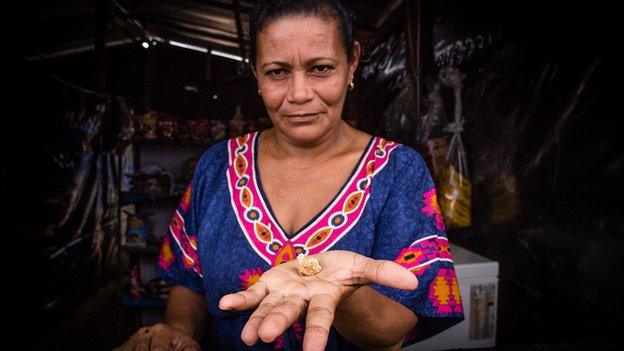
A miner here can earn in a week what an average professional in Caracas earns in a month
Critics say the government has allowed illegal mining to grow in the last 15 years.
Jose Felix Oletta was Health Minister in the 1990s, with the government party Copei which is today part of the opposition.
He is one of the main critics of the malaria surge in Venezuela.
"We're going backwards, and malaria threatens to spread to regions where the disease had been eradicated."
Perhaps unsurprisingly he lays the blame firmly at the government's door.
"They've been in power for the last 15 years, have stopped spending in health, and permitted illegality all over the country and at every level".
Nonetheless, both critics and government agree that it's the hunt for gold that causes malaria.
A miner here can easily earn as much in a week as a professional in the capital Caracas earns in a month.
As Dr Ortega puts it, "as the gold price goes up, so does malaria."